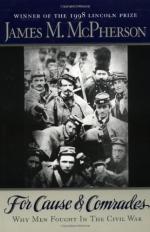
|
| Name: _________________________ | Period: ___________________ |
This quiz consists of 5 multiple choice and 5 short answer questions through Chapter 9, Slavery Must be Cleaned Out.
Multiple Choice Questions
1. Soldiers from all BUT WHICH of the following states are mentioned in the discussion of green recruits who wanted to prove their manhood through battle?
(a) Massachusetts.
(b) Tennessee.
(c) Indiana.
(d) Illinois.
2. After the discussion of "short-timers" psychology, the author notes the pride and honor of a soldier were bound up with the pride and honor of all BUT WHICH of these?
(a) Regiment.
(b) State.
(c) Nation.
(d) Family.
3. During "Chapter 6: A Band of Brothers," McPherson notes that studies of combat motivation have shown the need of soldiers to prove themselves to wane after how many battles?
(a) 4.
(b) 8.
(c) 2.
(d) 6.
4. An experience at Gaines Mill on June 27, 1862, where the Union line slowly began to leak stragglers, was described by a corporal from which state?
(a) Pennsylvania.
(b) Illinois.
(c) North Carolina.
(d) Georgia.
5. In the discussion of hyped-up battle behavior, McPherson notes that the phenomenon has been described as all BUT WHICH of the following?
(a) Military craze.
(b) Battle rage.
(c) Fighting madness.
(d) Combat frenzy.
Short Answer Questions
1. In May 1864 the 7th New York was delighted to be ordered into action; they were less excited nine months later after having lost how many men?
2. During the discussion of primary group cohesion, a soldier in the 122nd New York wrote to his sister in response to how he kept going through all BUT WHICH of these battles?
3. After the battle of Chancellorville, a lieutenant in the 17th Connecticut wrote home that the captain had resigned and gone home; what was the captain's name?
4. In the discussion of the battle energy, an anemic Yale graduate--who later died at 26--recounted that the double-quick was not a fast enough pace; what disease did the man have?
5. In the discussion of Bell Wiley's study of Billy Yank, how many Union soldiers were interested in emancipation out of every ten surveyed?
|
This section contains 307 words (approx. 2 pages at 300 words per page) |

|




